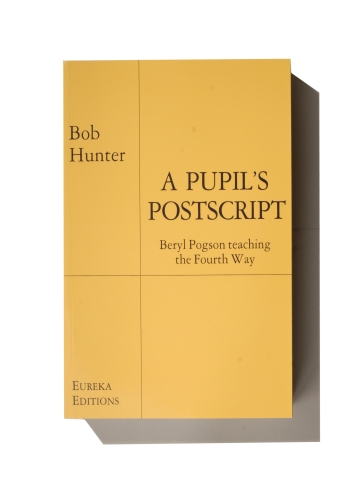
A
PUPILS'S POSTSCRIPT
Bob
Hunter /Beryl Pogson
Compiled by Bob Hunter
In this book, Bob
Hunter, who had been reading the ideas based on the Teaching of G.I.Gurdjieff,
P.D.Ouspensky and Maurice Nicoll, as a young man in his native Australia,
describes his encounter with working groups in England.
He takes the reader through his discoveries under the inspired leadership
of Beryl pogson in the 1960's and 1970's, explaining how the ideas he
had studied before were brought to life by the experience of working at
The Dicker in Sussex, the home of Beryl Pogson's group.
Bob also was the person who kept the notes at the meetings and so much
of this book is concerned with the teaching given rather than subjective
personal experience.
REVIEW:
An everyday odyssey
By a student of the Work
ESOTERICISM is given a quite credible face in this engaging book about a group of seemingly ordinary people struggling towards self-awareness.
Not before time, some may think, considering that certain sects that have arisen with the dawning of the age of Aquarius tend to drag into disrepute any movements suspected of having an unorthodox view of life.
A Pupil's Postscript, on the other hand, gives an insight into a teaching known as the Work that, along its Fourth Way odyssey towards self-realisation, lays bare the ignorance on which the less tenable of society's orthodoxies are based - particularly the comforting belief that we are quite all right as we are and everything will sort itself out in the end,
The Work is an apt name for this discipline for it believes that we need to change and that this is impossible without a lot of effort. The catch is that it must be voluntary effort. Considering the sacrifices entailed - the greatest of which, paradoxically, is to give up unnecessary suffering - we would need to be very convinced of grievous shortcomings in ourselves before commiting to this regime.
Especially as we are sure that any suffering, any unpleasant emotions that we might experience are unavoidable. Mind you, it is easy to see that some of our acquaintances worry about quite unnecessary, vain things. But they are not us. Nor are we asleep night and day, as the Work claims most people are.
Oddly enough, the people whose inner lives we can examine in this reminiscence of activities at The Dicker, the headquarters of Beryl Pogson's groups, near Hailsham in Sussex, are asleep a good deal of the time, on their own admission, and as shown by an exercise they call self-observation. As their psychological 'tasks' show up their vanities, we see that they certainly are 'sinners' - in the sense of what a Work teacher has shown is the original Gospel meaning, one who 'misses the mark'. But this knowledge is gleaned so gradually that it comes as a shock when we suddenly realise, thanks to one of those observations hitting home, that we too are sleep-walkers.
Our workaday self may not be as deeply asleep as when in bed, but all the same it acts mechanically, as in a daydream, compared with the state of being truly conscious, which can be only imagined. If we think our case is not so, it is easy to test our conviction by trying, as an experiment, to see how long we can remember ourselves; that is, hold an awareness of where we are and what we are sensing or performing. When we 'come to' some time later we will realise that in a matter of seconds rather than minutes we forgot the exercise and thus had been acting, or reacting, automatically.
Some actions, of course, are best performed automatically if not instinctively, but making important decisions in a semi-conscious a state is fraught with hazard. Without practising certain principles aimed at self-awareness, the Work says, we lack the ability to be really present in ourselves whenever such presence is needed. Not surprisingly, self-awareness has a wider application than only on occasions of great moment. Life is a continuous series of choices to a person able to remember himself or herself.
All this may sound
more psychological than esoteric. Actually, although Work leaders regard
their message as 'esoteric Christianity', this book, being a report of
a basically oral teaching, may be mesoteric at best. Some people will
be only able to see it as exoteric, which is what might be expected after
reading the text, expecially where it maintains that a person needs to
possess a 'magnetic centre' to be attracted by
esoteric ideas.
But why esoteric Christianity? Mainly because at the core of both teachings is the idea that before he can regenerate, man must first learn to think in a new way and then he must transform his superficial outer part into his essential inner part. Both systems call on man to awake. Both insist that hard, uncompromising Truth is not enough to effect the needed transformation. It must be wed to the Good. Seeing the good of it gives truth its real meaning. The Gospels speak of these matters in parables, but it is thought that their inner meaning was revealed in secret oral teaching.
It was obviously one of Mrs Pogson's aims to bring out the good as well as the truth of the Work principles. One lasting impression the book gives is her assurance that while we cannot change the world or other people's mechanicalness we can alter the way we react to them, which transforms the effect of their impressions on us.
Running to 500 pages,
A Pupil's Postscript is a great value to people seeking fresh meaning
in their lives.
BACK